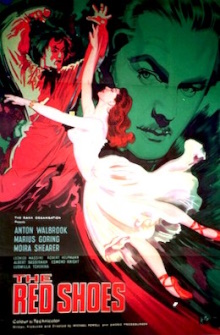This was added to my list because it’s a film by the Archers, the partnership between Michael Powell and Emeric Pressburger. I can’t say that I like it all that much even if it is known as one of the best British films of all time, but I am astounded that this really is all about a ballet production. In fact, its central feature is a performance that goes on for nearly twenty minutes and most of its cast are professional ballet dancers. There’s a delicious uncertainty for a long while as to where exactly this film is leading but it becomes more conventional once two of the main characters fall in love with one another.
Boris Lermontov is the impresario of a world-renowned ballet company. When the company arrives to perform in London, music student Julian Craster is dismayed to discover that the score credited to his teacher was actually stolen from him. He confronts Lermontov, the latter recognizes the young man’s talent and hires him to work for his company. Meanwhile Lermontov attends a party thrown by a rich patron of the arts and is displeased that it is actually an audition by the woman’s niece, the young dancer Victoria Page. He hires her anyway as a supporting dancer and is later impressed when he sees her in a matinee performance of Swan Lake. Both Craster and Page shoot to stardom when Lermontov mounts a new ballet, The Red Shoes, based on the fairytale by Hans Christian Andersen. Craster is asked to write the score and Page becomes the principal dancer after the company’s previous star gets married. The new ballet is a huge success and Page stars in the leading role of other shows as the company tours all over Europe while Craster becomes the conductor. But trouble brews once Lermontov discovers that Craster and Page have fallen in love with each other.
It’s remarkable how much the film is all about ballet, treating even the plot and characterization as secondary concerns. It offers a behind the scenes look into how a ballet company is run, introduces the many different people involved in a show and even provides a glimpse of their day to day lives. Powell and Pressburger seem to have been motivated by a genuine love for ballet, as evidenced by the quality of dance performances, the number of professional dancers involved and even featuring cameos of famous names in the world of ballet. Yet this can’t be said to be a realistic film. The performance of The Red Shoes as shown here involves special effects and shots that would be impossible in any real-world stage performance. Moira Shearer the dancer who played Victoria Page complained that Lermontov’s company is completely unlike any real company and refused to accept the role for a year. Since I know nothing at all about real ballet, I found this movie magic version of it to be enthralling and I was quite wowed by the dance performance in the middle.
The central conflict has Page being forced to choose between becoming a great dancer and having a life of her own by marrying Craster. While this thematically fits the original fairytale, there’s nothing particularly interesting or insightful in the execution here. Craster is not a very interesting character and the romance he has with Page isn’t developed very organically. It pops up more or less out of nowhere as the film’s running time is almost completely devoted to ballet. Lermontov is the far more fascinating character beginning with his declaration early that ballet is his religion. He is obsessed with perfection and readily admits to being jealous yet he has zero romantic or sexual interest in Page. As he states, he is simply convinced that a great dancer must be devoted to dancing and nothing else. A director with a darker psychological bent like Hitchcock might have been able to make something out of his obsession but the Archers seem content to show only the superficial imagery that symbolizes this key conflict. I’m also not sure why they wanted to include elements like Craster’s work being plagiarized. It isn’t relevant and opening the film with Craster attending a ballet with his friends feels like the wrong move. The film would have been much better if it has opened with a scene showing Page’s determination to be a successful dancer.
I’d still consider this worth watching for the ballet performances and its depiction of the internal workings of a dance company. But I’m not terribly impressed by the theme of an obvious tension between art and life and wouldn’t consider this as an exceptional film.
